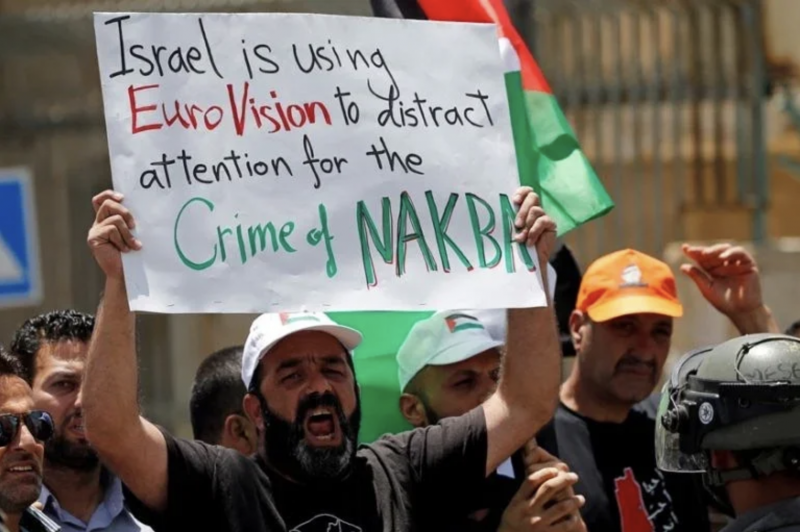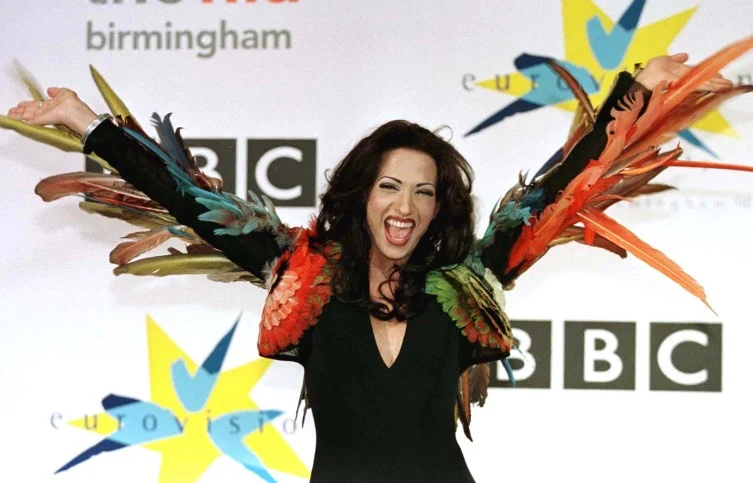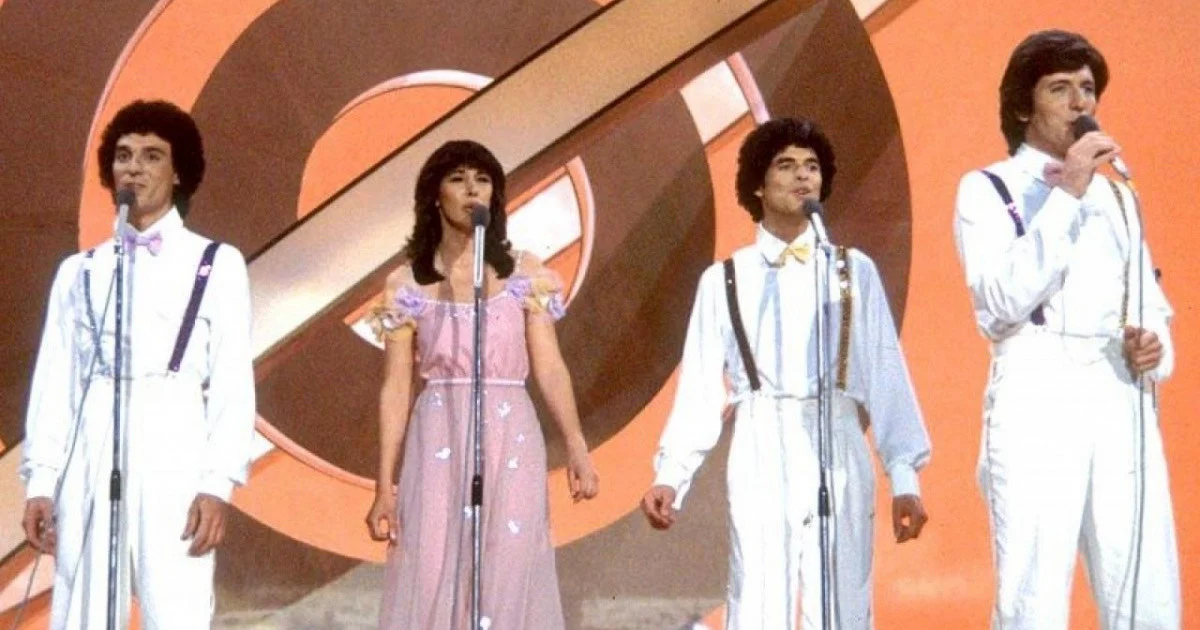
Israel's participation in Eurovision is criticized by pro-Palestinian activists. (Credit: Mussa Qawasma/Reuters)
Six years after its fourth and most recent victory, the Israeli delegation is “showing its teeth,” said a former Nordic-Palestinian organizer, speaking anonymously. “They’re eager to make their presence felt because, as the saying goes, the louder you shout, the more you think you’re right.”
‘Glamorizing the pain’
As the clock struck midnight on May 9, 1998, an electrified audience erupted into applause when the results of the 43rd Eurovision Song Contest were unveiled.
In a sleek, long black dress the Israeli contestant navigated through the red-draped aisles toward the coveted trophy.
“Dana International [Sharon Cohen] became a symbol that dominated all media attention at the time. Having an openly transgender woman win a competition like this in the late 1990s was truly historic,” said Fabien Randanne, a journalist at the daily newspaper 20 Minutes and a pop culture expert.
 Dana International, Israel's 1998 Eurovision winner. (Credit: Ian Hodgon/Reuters)
Dana International, Israel's 1998 Eurovision winner. (Credit: Ian Hodgon/Reuters)
The representative of the Israeli delegation, accompanied by the flamboyant anthem “Diva,” waved the blue and white flag as she saluted the cheering crowd.
More than 3,000 kilometers away from the National Indoor Arena in Birmingham, UK, where the grand final unfolded, the streets of Tel Aviv were filled with jubilant crowds commemorating this third victory, which held even greater symbolism than its predecessors.
“Dana International’s triumph was primarily a political statement,” said Dean Vuletic, an author and historian specializing in contemporary European affairs.
“Backed by secular figures in the government, the Israeli delegation sought to showcase the country’s embrace of diversity and its progressive stance, [perceiving this as] a stark contrast to its regional neighbors.”
Amidst the celebrations, dissent brewed within the Knesset and other influential institutions, as religious factions and conservative elements in power clamored for censorship, decrying what they deemed as the “forced and media-driven westernization” of Israel. As recounted by a demonstrator on French television in May 1999, just as Jerusalem braced to host the upcoming competition, Israel stood at a crossroads.
As a quasi-historic member of the European Broadcasting Union (EBU), the organization behind Eurovision, Israel has experienced a rollercoaster ride of musical and commercial ups and downs, often stirring intense euphoria that is viewed as unfair by other participating members.
Now, half a century since its inception, Israel stands as a cornerstone of the world’s most-watched non-sporting event.
Recognizing the vast platform it offers, the country persists in what the former organizer describes as “glamorizing the pain.”
“The charm offensive has been effective for 50 years. Despite wars, conflicts, and tragedies, it persists, for better or for worse,” the source said.
The ‘politics’ of integration
Before evolving into a grand spectacle of kitschy performances and sometimes naive lyrics, Eurovision was initially conceived in 1956 as a platform to foster closer ties between the two halves of the Old Continent in the aftermath of World War II.
Although only seven countries participated in the inaugural edition, the competition, under the guise of its directors proclaiming its apolitical nature, gradually expanded to include around 20 nations by the glittering seventies. Then, in 1973, Israel became the first non-European nation to clinch the title of best continental song.
“To qualify, one simply needed to be an active member of the European Broadcasting Union. Israel, like numerous countries across the Mediterranean, has held membership since its inception,” said Anthony Granger, founder of the specialized website Eurovoix.
“This also explains why Arabs are hesitant to partake in these festivities,” added Vuletic.
Yet, from Egypt in 1980 to Lebanon in 2005, numerous informal delegations sought to participate, only to retract their bids due to government mandates prohibiting the broadcast of performances by Israeli contestants.
In its 68-year history, Morocco remains the sole exception, sending one of its talents — Samira Said in 1980 — to grace the expansive stage of an event that has become a nexus for aspiring artists.
“Eurovision represents a complete package; nothing should be censored for the sake of fairness,” said Randanne, recalling the events of 1978 when Jordanian state television opted to announce Belgium’s victory instead of Israel’s, the actual winner. This pattern repeated a year later, with the Israeli group Milk and Honey’s rendition of “Hallelujah,” indirectly challenging Menahem Begin, then prime minister of Israel.
 Milk and Honey in 1979. (Credit: Screenshot)
Milk and Honey in 1979. (Credit: Screenshot)
The contours of ‘soft diplomacy’
The controversial 1980s marked a pivotal period for Israel within an organization that, despite the prevailing trends, assumed a stance of traditionalist moderation, striving for heightened neutrality amidst ongoing societal transformations.
Eurovision responded to surging viewership by tightening its ethical guidelines and filtering naive messages that champion coexistence and tolerance, according to Vuletic.
Once a consistent favorite, Israel now finds itself less prominent in the rankings. It leaned towards Middle Eastern tones and rhythms, yet viewed the contest as an avenue for fostering ties with historically rich nations.
Despite lacking diplomatic relations, the government — led by Yitzhak Shamir at the time — has long conveyed subtle messages to foreign counterparts through symbolic gestures such as awarding maximum points to Germany in 1982 and then to Yugoslavia, said the anonymous source.
Nearly two decades after its previous victory, Israel once again took center stage at the cusp of the new millennium, presenting an LGBTQ+ candidate who was vilified by conservatives and adored by a progressive and activist constituency.
Escorted to her appearances under heightened police protection, Dana International symbolized a more vibrant and diverse representation, reflecting Israel’s aspirations during that time.
“This undoubtedly reflects the country’s desire to demonstrate its pioneering spirit, even compared to liberal democracies,” said Vuletic, alluding to the stringent security measures implemented around all Israeli contestants since the “trauma” of the 1972 Munich Olympic Games attack on athletes from Israel.
More controversy
On the eve of its 45th participation, Israel is still bombarding the Gaza Strip following Hamas’ attack on Oct. 7. However, it seems to be eyeing Eurovision more than ever. The extravagant show has evolved into a platform with politicized undertones.
“President Isaac Herzog has emphasized the importance of Israel’s representation in major international competitions, particularly in such circumstances,” said Randanne.
Even before its release, the song performed by 20-year-old Eden Golan stirred controversy due to its lyrics lamenting the Oct. 7 attack, prompting calls for a boycott.
 Singer Eden Golan, representing Israel with the song "Hurricane," in rehearsal before the second semi-final of the 68th Eurovision Song Contest (ESC) at the Malmo Arena, Malmo, Sweden. (Credit: Jessica GOW/TT News Agency/AFP)
Singer Eden Golan, representing Israel with the song "Hurricane," in rehearsal before the second semi-final of the 68th Eurovision Song Contest (ESC) at the Malmo Arena, Malmo, Sweden. (Credit: Jessica GOW/TT News Agency/AFP)
The European Broadcasting Union (EBU), concerned about its reputation following pro-Palestinian demonstrations in Malmö, the host city of the 2024 edition, has been reacting since February.
They reiterated that Israel would take part in the competition, despite internal disagreements over the song’s political nature. Initially titled “October Rain,” the track was deemed too political and underwent modifications following discussions between the EBU, Golan’s producers, and concerned parties.
This article was originally published in L'Orient-Le Jour. Translated by Sahar Ghoussoub.
